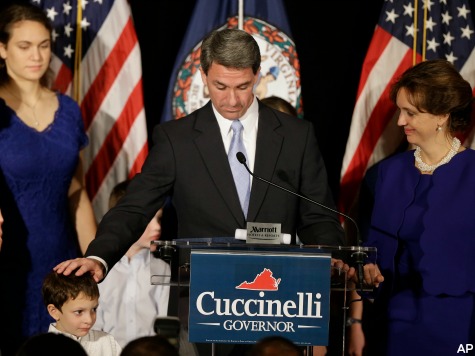Election Day 2013 is finally behind us. The media are happy that the left seems to have won on all fronts: a Tea Party favorite was defeated in Virginia, a radical socialist will be mayor of New York City, and the Republicans’ big winner was a noted “conservative,” i.e. one in quotation marks. But the real takeaways are a little deeper, and leave political debate more or less where it was, with Democrats burdened by a failing president and Republicans riddled with factional divisions. Here are some of my own observations.
1. The 2016 Republican primary is a search for “not-Christie.” The media have crowned New Jersey Gov. Chris Christie as the presumptive Republican nominee in the next presidential election. (They will turn on him as soon as it matters.) Republican voters want a candidate who can win, but they are not in the mood to pick yet another blue-state moderate who is weak on Obamacare and a variety of other issues. The search for “not-Christie” is on, and the question is whether anyone can match his charisma or his fundraising.
2. Bill de Blasio still has to earn respect. New York City was eager for a change, especially after Bloomberg overstayed his welcome: it was all but certain that a Democrat would win. De Blasio was long considered too radical, but benefited from Anthony Weiner’s self-destruction and a split between the other frontrunners. Yet his support remains shallow, and New Yorkers may quickly reject his policies. If he keeps the best of the Giuliani-Bloomberg legacy, voters will continue to overlook the occasional leftist indulgence.
3. The Tea Party is alive and fighting. Ken Cuccinelli was a Tea Party leader from the beginning, and led the legal challenge to Obamacare. So a loss for him is a blow to the movement. Yet he was supposed to lose by double digits, and came very close to winning, especially once he focused his message on Obamacare. A consensus is emerging Cuccinelli relied too heavily on old Republican campaign hands–and was abandoned by an establishment eager to see a conservative defeated. That will steel the Tea Party for fights to come.
4. Vote Libertarian, get bigger government. Conservatives got the lesson that liberals got in 2000. While a dissenting vote for a third party has a certain narcissistic appeal, in America’s winner-take-all system, it is effectively a vote for the candidate you like least. Terry McAuliffe did not win a majority in Virginia, but a win is a win, and the Libertarian vote made the difference several times over. If the intent was to send a message to Republicans, the effect was to remind the voters of the importance of party unity.
5. Social conservatism remains the GOP riddle. The biggest challenge facing Republicans, especially as 2016 draws nearer, is how to run socially conservative candidates that do not alienate socially liberal voters. Pointing out the Democrats’ radical values on issues such as abortion only goes so far. There are no easy answers, and what works in one state may not work in another. The only general rule is that candidates do better when they can project a sense of tolerance toward others, regardless of differences of values.
6. The media are still a joke. If you needed further proof of the media’s bias, you needed no more than they provided on Election Day, when National Public Radio aired a story about money in politics that focused on an obscure judicial election in Michigan rather than the millions flowing into McAuliffe’s campaign in Virginia. High-minded journalists generally care about money in politics only when it benefits Republicans. Otherwise they are content to look the other way–especially for a Clinton crony like Big Mac.
7. The President is still in trouble. While Obamacare’s defenders rushed to declare McAuliffe’s win a victory for Obamacare, that is wishful thinking. (Republicans could only dare to dream that Democrats will run on Obamacare in 2014.) On Election Day, Obama’s approval rating dropped into the 30s for the first time–one point lower, in fact, than George W. Bush was at this post-Katrina point in his presidency. The Obamacare crisis is growing worse every day, and the president’s second-term agenda has no life in it.
8. Voters are in no mood for new taxes. Colorado voters overwhelmingly rejected Amendment 66, which would have raised $1 billion in new revenues, ostensibly for education, while doing away with the state’s flat tax rate. In general, Colorado’s Democrats are on a losing streak, having lost two state senators in recall elections over gun rights. But the rejection of new taxes in the blue state may also have national importance as Washington heads into yet another intense round of negotiations over the federal budget.
9. The shutdown hurt. The shutdown might have been a good opposition strategy, and looks better in retrospect than it did at the time, as Democrats rush to embrace delays to Obamacare that they rejected just a few weeks ago. But it did have a cost, and one of those costs may have been Virginia, where many federal employees live and work. Christie also contrasted his state’s governance with dysfunction in Washington–though, ironically, he has often failed to work well with the Democrat-controlled New Jersey legislature.
10. There is room for Republican optimism. Going into 2014, the Republican Party is deeply divided on a variety of issues, especially immigration. The establishment-versus-Tea Party fight will only become more intense as primaries loom. Yet McAuliffe barely limped to a weak win; de Blasio won almost by default; Cuccinelli put on a respectable showing; and Christie romped. There are 30 Republican governors, control of the House seems secure, and the Senate is still winnable. Good times may yet be ahead.

COMMENTS
Please let us know if you're having issues with commenting.